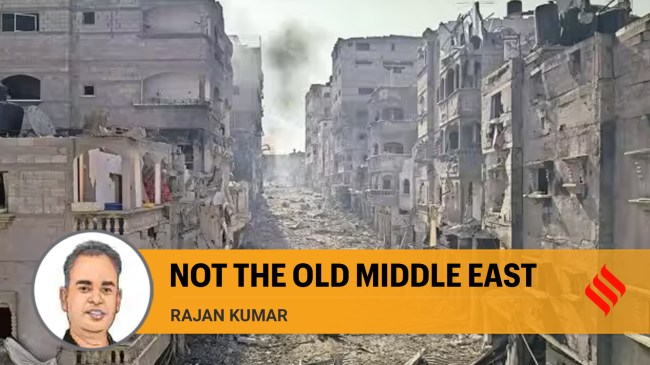Opinion The old Middle East is not back
In every crisis, there is a silver lining to be discovered. The recognition of Palestine would be the first step in that direction
 A view of the rubble of buildings hit by an Israeli airstrike, in Jabalia, Gaza strip, Wednesday, Oct. 11, 2023. Israel has launched intense airstrikes in Gaza after the territory's militant rulers carried out an unprecedented attack on Israel Saturday, killing hundreds of people and taking captives. Hundreds of Palestinians have been killed in the airstrikes. (AP Photo)
A view of the rubble of buildings hit by an Israeli airstrike, in Jabalia, Gaza strip, Wednesday, Oct. 11, 2023. Israel has launched intense airstrikes in Gaza after the territory's militant rulers carried out an unprecedented attack on Israel Saturday, killing hundreds of people and taking captives. Hundreds of Palestinians have been killed in the airstrikes. (AP Photo) The Hamas assault and the Israeli counter-offensives have once again thrust the Palestinian issue into the spotlight. The magnitude, ferocity and brutality of the Hamas assault have shocked the world. The militants mercilessly killed around 1,300 and abducted roughly 150 people. Hamas’ dastardly attack has invited severe criticism from all over the world. In addition, it has undermined the credibility of both Hamas and the Palestinian movement. Embracing reprehensible terrorist methods has tarnished their reputation. If the liberators turn so atrocious, it casts doubt on the very principles they claim to uphold.
An editorial in this paper, (‘After terror attack by Hamas on Israel, Old Middle East is back’, IE, October 9) argued that the “Old Middle East” is back, and this will shatter the prospect of a rapprochement between Saudi Arabia and Israel. While this assessment is accurate in the short-term, it is unlikely to hold over the long run. First, Hamas cannot fight a long-term war with Israel; regional powers, barring some provocations from Iran, have shown little inclination to escalate the conflict; and finally, Iran’s expanding influence in the region will make Saudi Arabia more vulnerable, pushing it closer to the US.
Hamas’ attack was to terrorise Israel and galvanise the West Asian states. It may have succeeded in repositioning the Palestine problem, but the states of West Asia are divided in their support of the Palestinian cause. In contrast, it has unified the fractured Israeli government which was in disarray due to internal political strife. Israel has mobilised its society, garnered Western support, and is determined to dispatch ground forces which might change the status quo in Gaza. Israel will not allow Hamas to rule in Gaza now. This is in marked contrast to its erstwhile policy, which tolerated the de facto rule of Hamas there. Daniel Hagari, a spokesperson for the Israel Defence Forces, stated, “Israel would no longer allow Hamas to exist as an entity next door. We are collapsing the governance and sovereignty of the Hamas organisation.” However, Hamas forces are unlikely to be exterminated, as they can operate from neighbouring territories.
Hamas’ ability to sustain the conflict rests entirely on the backing of Hezbollah and Iran. Without their support, the war would end in a couple of weeks. Tehran’s support of Hamas is hardly a secret, though it has denied its role in the present crisis. A complex web of networks exists between Hezbollah and Hamas, marked by tactical cooperation as well as rivalry. The Iranian regime has not condemned the brutality of the Hamas assault. Its Foreign Minister, Hossein Amir-Abdollahian, stated that Palestine has a right to resist occupation and blamed Israel squarely for the incident. He nonetheless qualified the statement by saying that “the actions of resistance groups in the Al-Aqsa Storm Operation were entirely Palestinian and self-motivated.” Iran’s President Ebrahim Raisi issued a similar statement praising the Palestinian operation against the Zionist regime. Tehran is working overtime to galvanise support in the Arab world. Its foreign minister visited Baghdad, Beirut and Damascus. He also met Hamas leader Ismail Haniyeh in Doha. Iran is trying to mobilise these states and prepare them in case of escalation. It is likely to steer clear of a direct confrontation with Israel at this juncture, but the potential engagement of Hezbollah could compel a shift in its strategy.
These developments have alarmed the Saudis. They are unequivocal in their support for Palestinian statehood but have estranged their ties with Hamas owing to the latter’s proximity to Iran and Turkey. The Saudis are wary of a growing wave of anti-Israel sentiment in the region. They will have to contain the pressure coming from the Arab streets to break all ties with the Jewish state. Riyadh has suspended its negotiations with Israel, but its vulnerability has multiplied. Therefore, Riyadh is likely to remain close to Washington, despite a chill in its ties with Israel. The Saudis cannot depend on China and Russia for their security as Iran has stronger ties with these nations.
Washington will remain engaged in the region for some time now. It is taking extensive measures to contain the crisis by deterring Hezbollah and Iran. It has deployed nuclear-powered USS Dwight D Eisenhower and the USS Gerald R Ford carriers in the Eastern Mediterranean to intimidate them. Antony Blinken visited Israel, Jordan, Qatar, Bahrain, Saudi Arabia, the UAE and Egypt to assure these states of civilian protection. The Biden Administration avoided provocation by not implicating Iran directly and tempering down its statement from “Israel has the right to defend itself” to call for “civilian protection” and humanitarian aid to Gaza.
In the short-term, restraining both Israel and Hezbollah are the two primary concerns to prevent the crisis from spiralling into a regional conflagration. The international community must protect civilians in Gaza from Israel’s counteroffensive. New Delhi should continue to engage with both sides to encourage a ceasefire and a dialogue. In every crisis, there is a silver lining to be discovered. The recognition of Palestine would be the first step in that direction.
The writer teaches at School of International Studies, Jawaharlal Nehru University, Delhi. Views are personal





